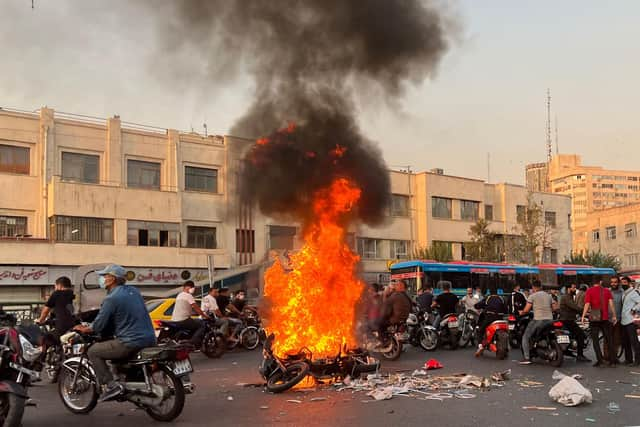Iran's tyrannical mullahs using Ramadan to try to crush nationwide uprising in their latest corruption of Islam – Struan Stevenson
But, deaf to all remonstrations over a shoot-to-kill strategy that has caused the deaths of more than 750 protesters, the theocratic regime has continued on its repressive path. Now, during the holy month of Ramadan, the police are demanding even greater powers to crush dissent.
Hassan Karami, the commander of the regime’s Law Enforcement Forces’ special units, has called for the number of security police to be doubled to confront the ongoing nationwide insurrection. Karami was sanctioned by the European Union in April 2021 for his role in the savage response to mass protests that took place in November 2019, when more than 1,500 mostly young protesters were killed. He has coordinated the use of lethal force for crowd control and the suppression of protests during the current uprising.
Advertisement
Hide AdAdvertisement
Hide AdHis LEF special units have also been responsible for serious human rights abuse against prisoners detained during the disturbances. Karami has boasted that confronting the protests would be part of the agenda of his LEF Special Units during the Nowruz holidays and Ramadan. He described the uprising as “extreme sedition” and told the state-run Mehr news agency that his units were responding to unrest in at least 400 cities and regions and that this required a doubling of police numbers.
Meanwhile, to further the theocratic regime’s repressive tyranny, the police and security services have shut down dozens of businesses and issued warnings to many others for disrespecting Ramadan fasting rules. A police official in Khuzestan Province said that 55 businesses were shut down in Ahvaz, the capital of the province, for breaking the rules of fasting. Colonel Mohammad-Hossein Mohammadvand said 229 businesses were inspected, with 55 closed and 14 others receiving warnings that they faced closure if they failed to abide by the rules.
Inspections will continue until the end of Ramadhan, he said. Similar inspections are being carried out in other cities across the country. The rules require restaurants, cafes, coffee shops, tea houses, ice-cream and juice bars to remain closed until fasting ends around sunset. In the capital Tehran, sunset falls at around 6.35pm at this time of year.
The same rules are enforced in all public places including gyms, schools, universities and factories, where cafeterias and canteens are closed throughout the month of Ramadan. Even eating inside cars is forbidden. With echoes of Stalinist repression, the hardline crackdown has seen authorities urging members of the public who witness anyone violating the fasting or hijab rules to send a text message to a special designated number online.
Large government-sponsored billboards advise similar tell-tale action. Only restaurants in hotels, airports and stations can apply for special licences to cater for tourists or travellers, provided their windows are screened so that anyone eating inside cannot be seen from outside. Even then, the police carefully control the number of licences issued.


The mullahs ludicrously claim that those who eat, drink, or smoke in public during Ramadan are exhibitionists who refuse to follow the fasting rules. Such behaviour is punishable by a sentence of ten to 60 days in prison or up to 74 lashes, according to article 638 of Iran's Islamic Penal Code. During the holy month of Ramadan, when Muslims celebrate the fundamental messages of Islam – freedom, justice, mercy, and emancipation – 85 million beleaguered citizens of Iran have seen their rights and civil liberties crushed by this fascist theocratic dictatorship.
The Islamic Republic’s elderly Supreme Leader, Ayatollah Ali Khamenei, has sought to position himself as the representative of God and Islam on Earth. He regularly brands his opponents as enemies of God. Protesters can be accused of the spurious offence of ‘moharebeh’ or ‘waging war against God’, which carries the mandatory death sentence. Since the 1979 revolution which ousted the hated Shah, but was hijacked by the mullahs, the main democratic opposition movement, the Mojahedin-e Khalq (MEK), has been the key voice calling for freedom, justice and democracy. They have paid a high price for their dissent. More than 30,000 mostly MEK political prisoners were executed in 1988 in a massacre ordered by a fatwa from the then Supreme Leader Ruhollah Khomeini. Courageous MEK resistance units have been directing the current uprising across Iran.
Maryam Rajavi, the charismatic president-elect of the National Council of Resistance of Iran (NCRI), of which the MEK is a key component, said in her Nowruz (new year) address that the MEK has always made it clear that Islam is a religion of compassion and emancipation, not what the fascist mullahs claim it to be. She emphasised that “Islam is not misogynistic but founded on freedom, equality and free choice for all individuals, regardless of their gender or religion”. And she pointed out that the MEK has rigorously opposed religious compulsion, stressing that this runs counter to the teachings of Islam. “The MEK’s selflessness in the face of the regime’s religious dictatorship has exposed Khomeini and his successors as demagogues who exploit Islam for their own interests, and as criminals who have imprisoned and oppressed the Iranian people, while spreading death, terrorism and fundamentalism throughout the region,” Mrs Rajavi said.
Advertisement
Hide AdAdvertisement
Hide AdAs the uprising in Iran, which began in September over the killing of a Kurdish woman, Mahsa Amini, by the morality police, for not wearing her hijab properly, continues to gain momentum, it is time for the US, EU and UK to take concrete steps to show their support for the Iranian people and their determined and courageous demands for regime change.
Struan Stevenson is coordinator of the Campaign for Iran Change and chair of the In Search of Justice committee on the protection of political freedoms in Iran. He is an international lecturer on the Middle East. His latest book is Dictatorship and Revolution. Iran – A Contemporary History
Comments
Want to join the conversation? Please or to comment on this article.